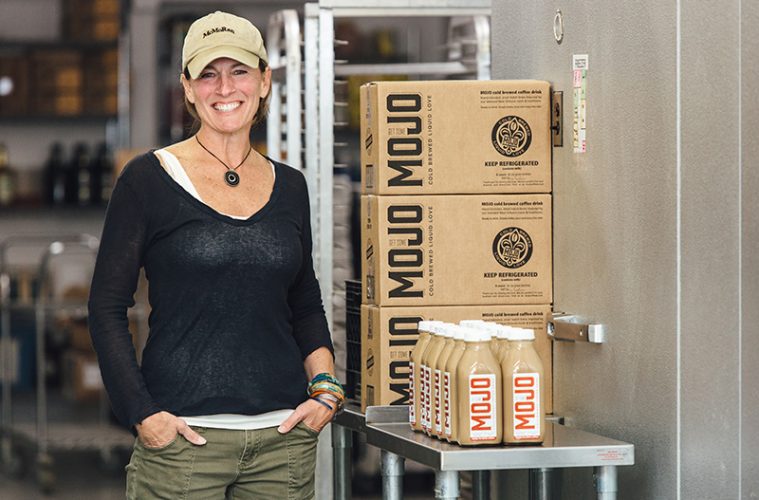When Ann Brainard wrangled parent volunteers for her kids’ school events, she always brought along a secret weapon—a buzzy elixir that was a staple in her native New Orleans but relatively unknown in New England, where she has lived for 17 years.
“I called it happy juice, because it really makes you happy,” Brainard says. Just a few shots of her special cold-brewed coffee, with a touch of milk and lightly sweetened, would keep the team running (and running to her to find out exactly what it was that she’d given them). The deep, rich flavor is a bit like melted coffee ice cream, though darker and not nearly as sweet.
In New Orleans, Brainard says, everyone has potent cold-brewed coffee extract in the fridge, ready to be diluted with hot water for a warm beverage or mixed with milk and served over ice. “I thought that was how everyone made coffee,” she recalls.
Eventually, the influence of her family’s background in running New Orleans restaurants combined with the demands of friends who suggested that she bottle and sell her “happy juice,” and Brainard launched Mojo, a ready-to-drink coffee concoction based on a recipe she recalls from her childhood. But she started very, very small, with a table at a kids’ craft show, surrounded by children hawking painted rocks and gimp bracelets.
“I was the only adult selling there,” Brainard says, “but I really wanted to see what people who didn’t know me thought of it.” They thought it was delicious, so, emboldened, she tried out some more grown-up festivals and farmers’ markets. Eventually, Wenham’s Grassy Roots sandwich shop, which had been selling Mojo by the cup, suggested packaging it in a multiserving size.
That original Mojo was sold in mason jars, but thanks to a new relationship with Puleo’s Dairy in Salem, Brainard bottles her brew, a mixture of strong coffee, local milk, and cane sugar, in classic glass milk bottles so she can use the equipment at Puleo’s.
That’s not the only North Shore partnership Brainard has cultivated. After outgrowing the tiny commercial kitchen she’d been renting in the basement of First Church in the center of Wenham, she started sharing space with Lark Fine Foods, the gourmet cookie producer in Essex. It’s a good fit, as cold brewing coffee doesn’t take up much space—just a bunch of plastic five-gallon buckets. And, of course, it’s hard to beat the scent of freshly baked cookies mixing with a hint of coffee that fills the place.
Cold brewing—steeping ground coffee in cold water overnight, or in Brainard’s case, for 13 hours—extracts a more complex coffee flavor with less acid than traditionally brewed coffee. Brainard says the intense flavor that results from the cold-brew process just makes sense. (When you brew using a drip coffee maker, the grounds are in contact with the water for only a few minutes and the heat releases the acidity.)
Just because the coffee is brewed cold, that doesn’t mean it has to be served cold. Brainard says you can warm it in the microwave or on the stovetop with no off-notes. She often gently reheats the coffee when she’s in the mood for a hot beverage—something she craved during last winter’s brutal pounding. Every time another blizzard hit, she and her husband used it as an excuse to create a different warm coffee cocktail, mixing in everything from vodka to schnapps.
While a schnapps version of Mojo isn’t likely to be hitting store shelves anytime soon, the company expects to be rolling out a few new products over the next year, including black Mojo, lactose-free Mojo, and a shelf-stable version, with the eventual goal of becoming a local, natural alternative to the ubiquitous coffee drinks distributed by Starbucks. And one that’s much stronger, too—each bottle of Mojo carries a warning to drink responsibly, as an eight-ounce serving packs a whopping 170 milligrams of caffeine.
Brainard limits herself to a few shots a day, she says. “I’m naturally caffeinated,” she adds with a laugh.

